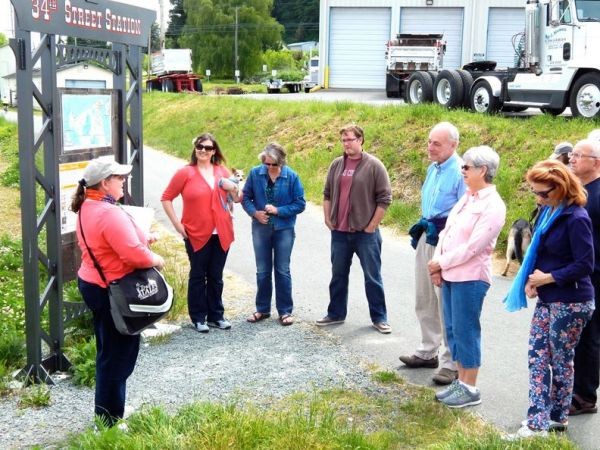Nature's Interpreters
By Nancy Olsen, Trail Tales Volunteer Coordinator
It is impossible to walk across a muddy eelgrass-covered shore or look over a wave-rippled bay without fairly quickly reflecting on what made it so. . . what natural forces were and are at work here – and what was it like on some other day in the past? Those thoughts and experiences are gifts that enrich us – but perhaps it is also part of nature’s survival strategy. Our varied experiences along the shore nurture us, but the thoughts that are triggered are essential to our collective stewardship of these truly wonder-full places. They are what spurs us to experience more, learn more, understand more, and – for volunteers – to share more. They are at the heart of the Trail Tales docent program, answering those questions: “What makes this so?” and “What was it like here in days past?” that help citizens understand how their choices can impact the health of our marine and estuarine waters.
It happens in subtle but important ways:
First, just providing the opportunity, impetus or destination for people to be on the trail and go outside encourages and . . . well, gets people outside. Once there on the trail, connection and learning through experience happens – even if there were no walk or leader. Ahhh, but there is a group walk! So already the connection people have through their experience is expanding with other people. The docents who direct observations to a particular plant, or feature of the shoreline or sound or sensory experience have just forged another connection between the visitor and their natural world. They will remember this, if even subconsciously . . . and if affects their awareness on another day.
The docent who relates events from the past or explains processes that are invisible or shares personal stories from other people broadens the visitors’ understanding and allows them to relate more personally to the world, even away from the shoreline, and even on another day. And when the docents’ stories allow the visitors to recognize their own inseparable connection to the environment and their numerous interactions that affect natural systems– they make different choices on another day.
There is a collective effect as well as an individual effect. When we have a community of citizens who are aware, interested, involved and engaged – through programs like Trail Tales – their collective choices and behaviors are reflected in the support of events and activities that maintain and restore natural habitats. Much research has documented over and over how these connections between people and nature inspire us. How understanding leads to appreciation and appreciation leads to caring and caring leads to deliberate stewardship.
Docent-interpreters are like wave energy that shifts the sands along the shore, gradually dancing every grain into a new position. Ultimately we have a dynamic but stable shore that supports its myriad organisms and maintains the beautiful complexities that had people wondering about things in the first place. Wondering “Why is this so?’, “What was it like here in the past?” and also “How do we preserve this for the future?”
By accepting you will be accessing a service provided by a third-party external to https://skagitbeaches.org/



